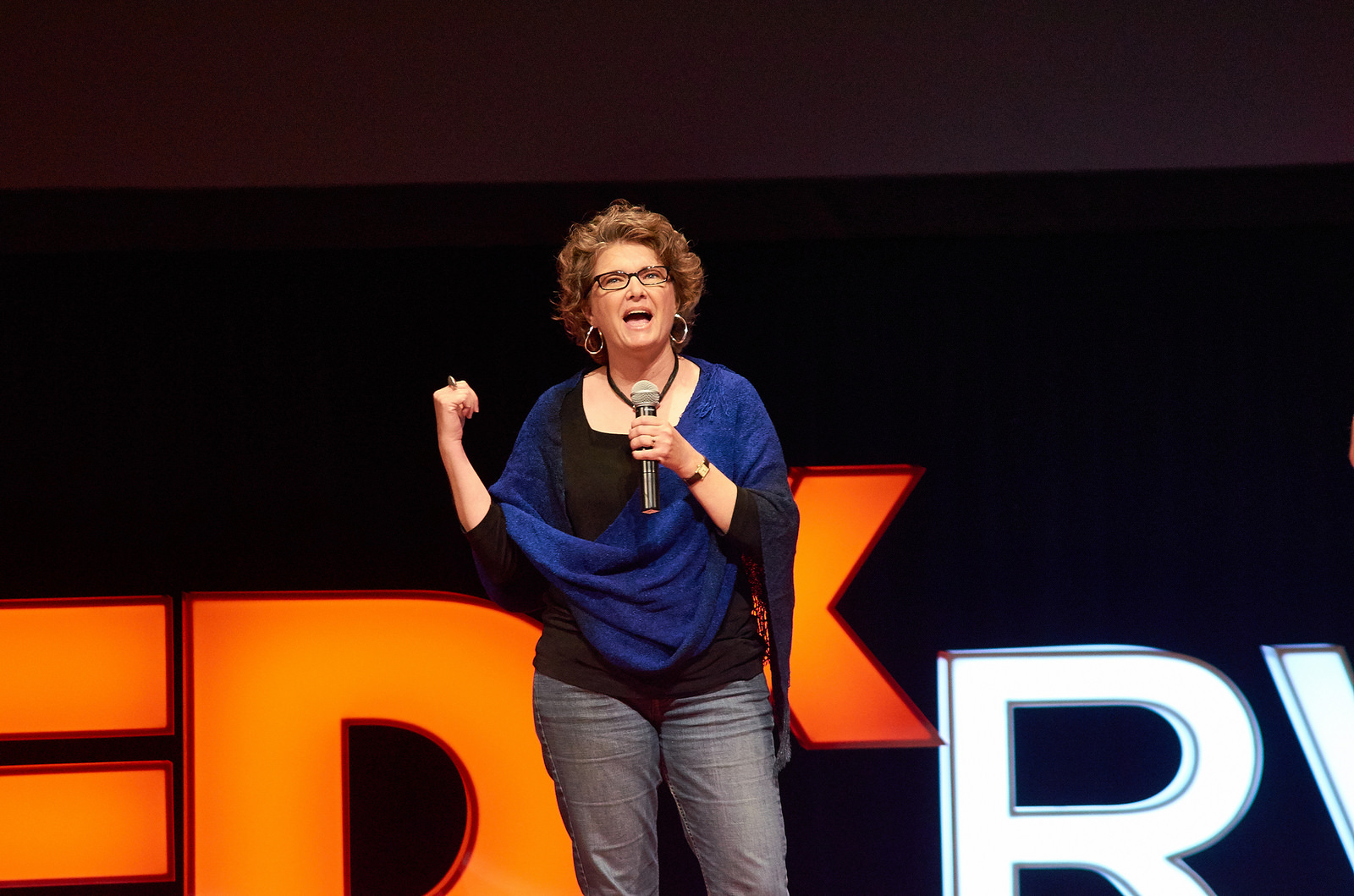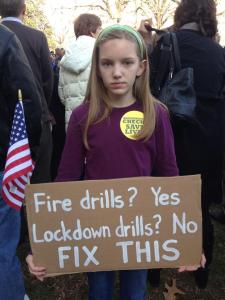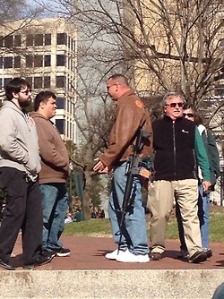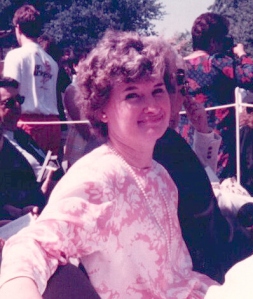The one-sentence request from the Richmond Public Schools’ Center for Families in Transition team was simple: “We are collecting some end-of-the-year data about the grocery program and would love to hear about your most memorable moment while delivering groceries to C-FIT families.”
I’m a speechwriter and a communications consultant who, for more than a year and since the pandemic began, has delivered groceries once a week to Richmond’s most vulnerable kids and families.

I know why organizations like C-FIT make requests like this. Maybe they want some heartwarming anecdotes to share with donors and grantors to help ensure that financial contributions and grants are renewed. Maybe they need persuasive messages to inspire more volunteers, like me, to donate a few hours every Thursday morning to make this grocery program possible.
So, my instinct is that I should absolutely not share my “most memorable moment while delivering groceries to C-FIT families” – the moment when a sleepy elementary-aged girl opened her front door at 10:15 a.m., to retrieve the six heavy grocery bags on her stoop that her mother had just called or texted her about, and looked out at me with such distress that I asked, from my car, “Do you need help?”
The moment, immediately after her wide-eyed nod, when I put on my mask and went to her door, only to discover, first from the powerful odor, that she was home alone with a toddler brother who was naked from the waist down and sleeping on a urine-soaked couch in a home littered with smeared piles of feces and puddles of piss.
The moment, after placing the groceries inside her door, when I drove a few blocks away and then pulled over – grappling with the many unintended, but tragic, consequences of calling for “help” – and dialed my most enlightened friends to determine the best action to take.
My instinct was not to tell most of my memorable moments – honestly.
Like the moment I learned that the young mother who received groceries for her three children at a run-down, one-room motel room – yet always made the time to text me a heart emoji or gracious “thank you have a blessed day” after her delivery was received – had just been sexually assaulted. Weeks earlier, I’d learned that — in addition to a better, steadier job — she was desperately seeking medical attention for a recently discovered lump in her breast. And now this.
Or that moment with another mom, this one on the fourth floor of a well-worn, budget hotel, who hadn’t answered my intentionally loud and intentionally “friendly” shave-and-a-haircut-two-bits knock.
Something told me to try her door.
Like many of the families to whom I deliver, her phone was out of order. I didn’t want to leave her groceries in the hotel hallway to be stolen. Just weeks early, one recipient had messaged me, “Listen it’s crack heads out there u can’t leave it there” when I texted a photo of the groceries outside her apartment door.
Not wanting to abort a “failed” delivery, I thought I might possibly – harmlessly – place them inside her room without so much as setting foot in her space.
Slowly, I reached for the door handle. It turned and I eased the door open a crack.
I’ll never forget the look on her face when her gaze met mine.
“You woke my babies,” she quietly hissed, coming toward me through the dark as if to smother the beams of light that framed me. She was clearly still praying they would settle, and that I wouldn’t dare to make so much as make a sound in response to her.
Light from the hallway seeped into her stuffy space, otherwise darkened by thick hotel curtains. I saw an entire home worth of family belongings, packed and stacked to the ceiling, giving the false impression of hoarding.
“I need them to sleep,” she moaned, her clenched teeth holding back the tirade she so clearly would have liked to give me – for that knock-knock-knocking, for that outrageous trespass – had it not been sure to fully awaken her kids.
“I didn’t want to leave them in the hall,” I whispered, gesturing at how vulnerable the groceries might have been, imploring her for forgiveness.
“I didn’t want anyone to take them,” I explained.
The baby’s stirrings became louder.
I know this sound. I know this desperation. I know the prayer of the exhausted mother.
She heard it too. And the look on her face…
“No one would have taken them,” she almost sobbed to me, in exasperation, as if the very notion were ridiculous, and then the child’s sound became an inevitability, a point of no return.
“I’m so sorry,” I said, backing away as she dragged the groceries inside.
This hotel was so clearly full of desperate people.
But they were a community? They looked out for each other?
I hadn’t realized that.
The crying now demanding a response, she leaned her head against the door and silently pushed it shut, leaving me in the hallway, feeling horrible.
She was so strung out, so desperate, so sleep deprived.
I was trying to do the right thing, I consoled myself.
But I did the wrong thing.
My God. That poor woman.
That’s probably not the moment that will inspire another potential volunteer to fill my shoes.
In fact, potential volunteers definitely don’t want to know about all the times when you finally get through to a recipient – someone you texted well in advance of their delivery– to tell them their groceries are waiting on their stoop, only to learn that they have moved across the river or are spending this week on the other side of town.
That moment you realize that – while program parameters allow volunteers to donate such “undeliverable” food to a local pantry – the right thing to do is to drive these groceries to the hungry kids who need them – wherever that is – even if it means adding 45 minutes to your route or missing a scheduled appointment.
Who wants to know the “memorable moment” when you realize that the three school-aged kids in a dilapidated apartment with dog-shredded window blinds are completely sleeping through their virtual school day?
When, every week, they eventually answer your persistent, 10 a.m. knock-knock-knocking in their pajamas and wince when the sunlight hits their eyes? When you lament that they are no longer staying with their lovely grandmother in the tidy brick house just around the corner? When you ask, “Do you have laptops here?” (Yes.) When you ask, “Honey, do you have Wi-Fi here?” (Yes.) When you realize they simply have no supervision and no consequences? Is that the memorable moment I should share?
Perhaps I should share with C-FIT the ways in which this program has changed me.
How I now know parts of my own City – neighborhoods, schools and streets – I used to only hear or read about in the news.
How I now have a sober perspective about my petty disappointments in Richmond City services – like my annoyance that the City wastes money every single year, filling the same deep ruts and replacing the same washed-away cinders on my beloved Vita Course instead of installing proper drainage ditches and pipes under persistent problem areas. I think about these stupid “Fan District problems” as I dodge potholes and drive down City streets bordered by chain-link fences that look as though they’ve been blasted with a litter firehose.
Maybe I could share the memorable moment when – despite the pandemic and its poor impact on my career – I realized that I’ve not felt truly depressed since I started this gig. Because it offers a weekly injection of pure gratitude.
Sometimes – as I knock-knock-knock and wait-wait-wait for recipients to come to the door – I examine these families’ doors. It’s so clear these doors have been busted in, locks changed, occupants seized, robbed or evicted. The frames are splintered, hinges torqued and twisted, doors and knobs dented, pounded and punctured.
The doors are a vivid canvas for the violence and sadness of these families’ lives. If I had real photography skills and could shoot them unobserved, it would make such a powerful photo essay – all the traumatized doors I’ve knocked on Southside, East End and Northside.
I’ve lived in this City for 28 years. My home was once robbed. The shuttered, wooden front door of my 1904 rowhouse was once kicked in by a guy – with a receipt in his pocket for 20 fireball shots from the nearby bar that had just closed for the night – who drunkenly mistook my house for his residence and raged that his roommates weren’t letting him in.
But we got an alarm system. And we strengthened our home’s defenses.
Thanks to the justice system that my family enjoys, the apprehended drunk paid for a professional and seamless repair of our splintered antique door.
Our family and our home are not without trauma.
But we have the privilege and resources to better treat and heal that trauma.
“Families in Transition” don’t.
I could share the memorable moment I began to better understand that.
But, instead, I’ll share the memorable moment – or, rather, the memorable message – I wish more people understood about “Families in Transition.”
Namely, that these people work.
That they don’t answer their doors sometimes because they are working.
That they text me, often hours after I made or attempted a delivery, apologizing because they aren’t allowed to use or answer their phone when they are working.
That their family members often come to pick up their groceries because they are working.
That I often deliver groceries to the convenience stores and fast-food joints where they are working.
That they are slow to answer the door some afternoons because they were up all night, working.
I suppose that’s it, really. That’s what I want people to know. That’s what I’ve learned:
That “Families in Transition” have unfathomably hard lives. That they endure hardships that we can’t even begin to comprehend. That they are doing the best they can with so little. That their kids need food. That their jobs don’t pay them a living wage. And that I’m immensely grateful that C-FIT and its supporters are helping them.

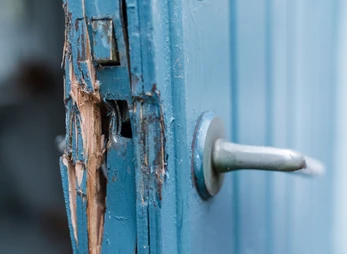
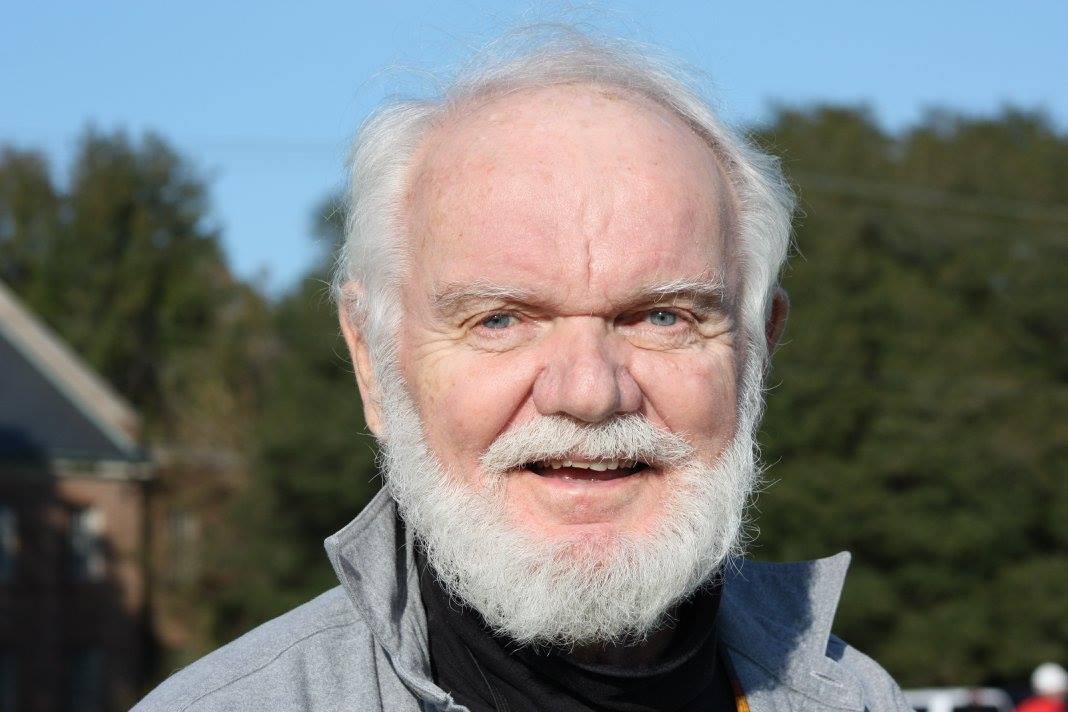 On behalf of the May and Kellam families, I’d like to thank everyone who came today. This is not an easy place to get to and many of you traveled here from a great distance. So thank you, all, sincerely.
On behalf of the May and Kellam families, I’d like to thank everyone who came today. This is not an easy place to get to and many of you traveled here from a great distance. So thank you, all, sincerely.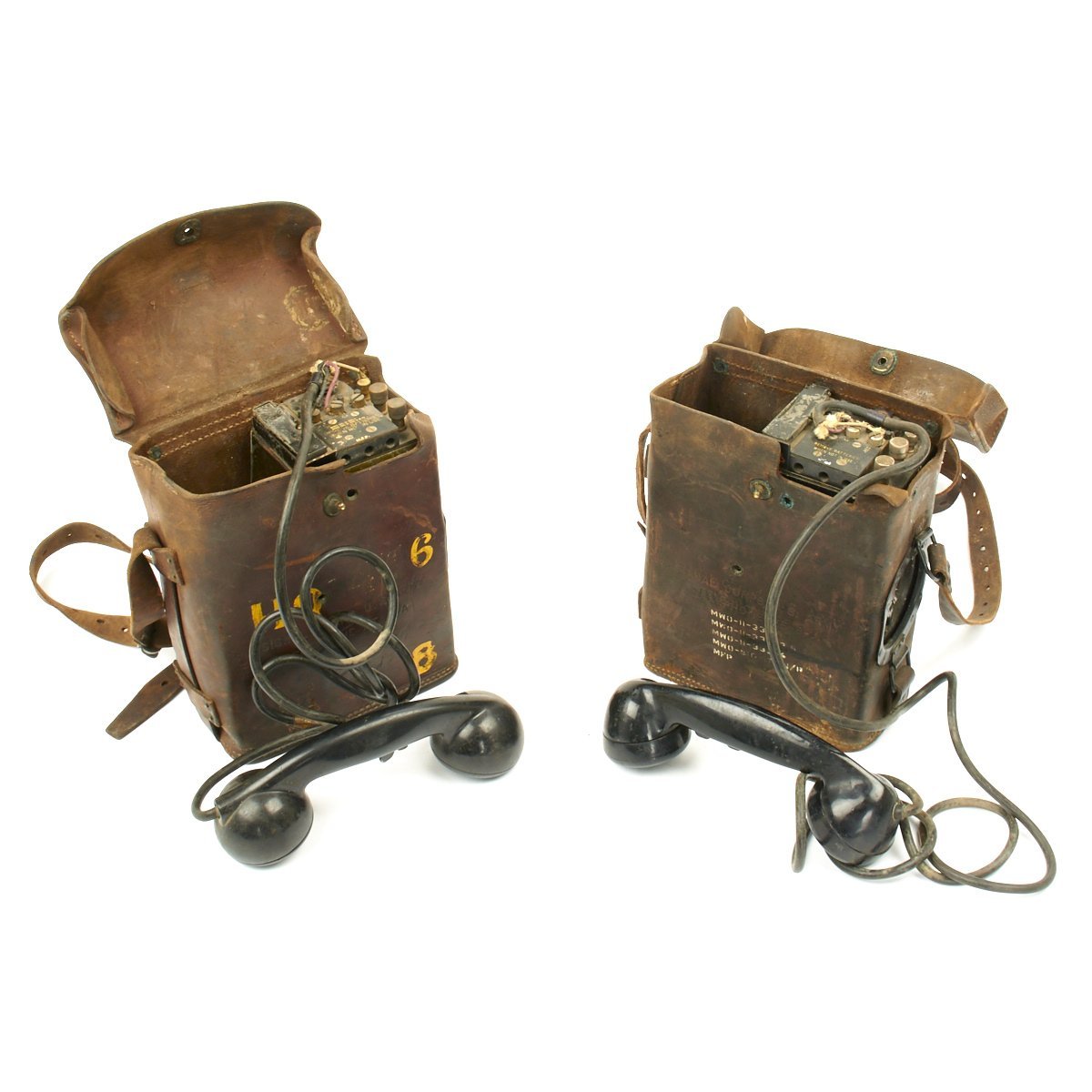 He strung yards of speaker wire across the block, throwing it over the existing wires, from our house to the others, so that Darcy and I could talk to our best friends on a pair of World War II Army field telephones.
He strung yards of speaker wire across the block, throwing it over the existing wires, from our house to the others, so that Darcy and I could talk to our best friends on a pair of World War II Army field telephones.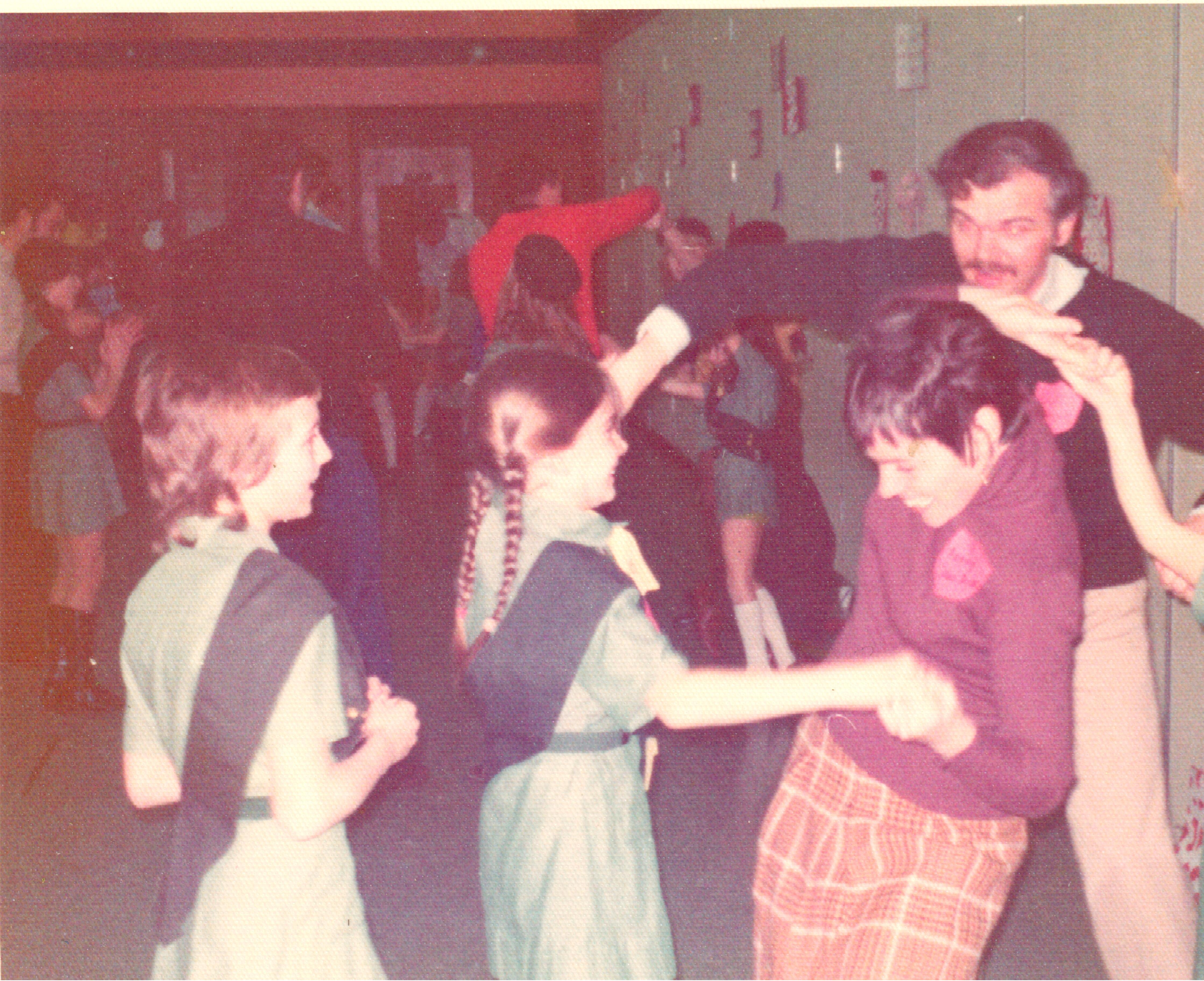 He was the best partner at the Girl Scout “Father-Daughter Square Dance.” He was the most fun. I’m sure all the other girls were jealous.
He was the best partner at the Girl Scout “Father-Daughter Square Dance.” He was the most fun. I’m sure all the other girls were jealous.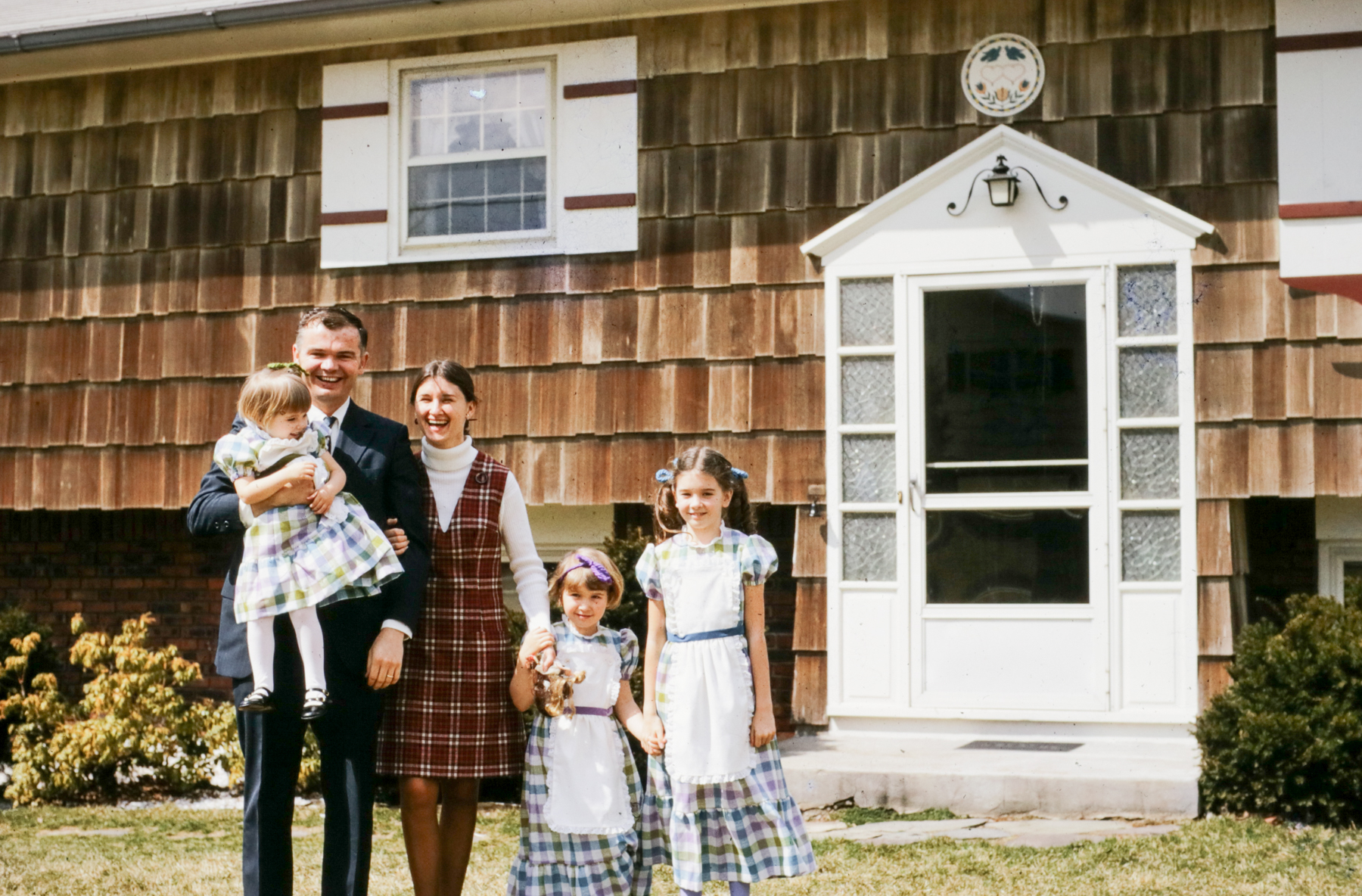
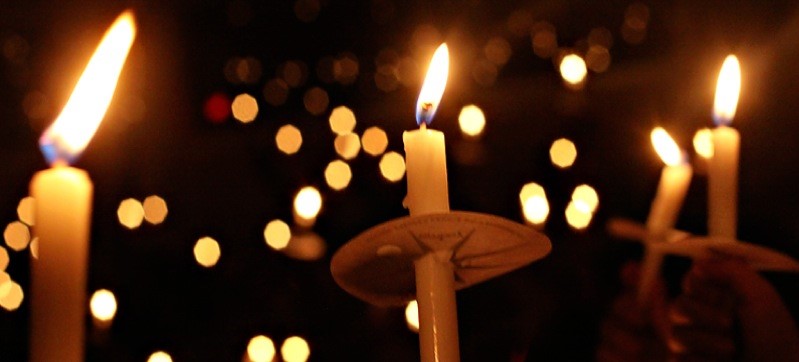 Each year, our church hosted a Christmas Eve service that concluded with everyone holding a candle. You’ve probably all experienced this. They’re so special. You just feel so special in those moments. And when it’s over, you blow out your candle and you put it in a box.
Each year, our church hosted a Christmas Eve service that concluded with everyone holding a candle. You’ve probably all experienced this. They’re so special. You just feel so special in those moments. And when it’s over, you blow out your candle and you put it in a box.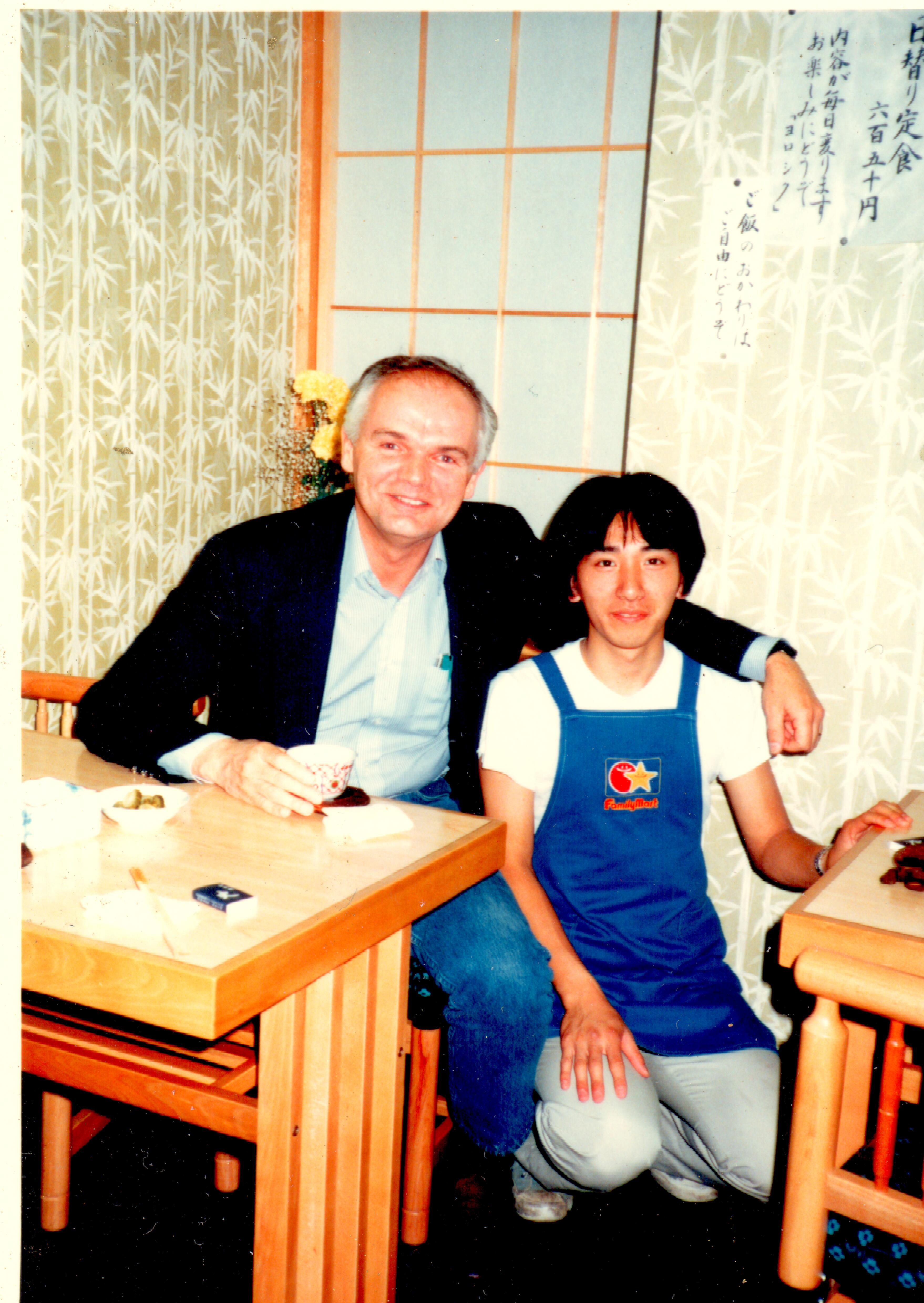 He befriended this guy Shinichi Nakasone at a Japanese flea market when Shinichi tried to buy my Dad’s World War II bomber jacket off his back. Days ago, Shinichi sent me a lovely note recalling all his visits to our home.
He befriended this guy Shinichi Nakasone at a Japanese flea market when Shinichi tried to buy my Dad’s World War II bomber jacket off his back. Days ago, Shinichi sent me a lovely note recalling all his visits to our home.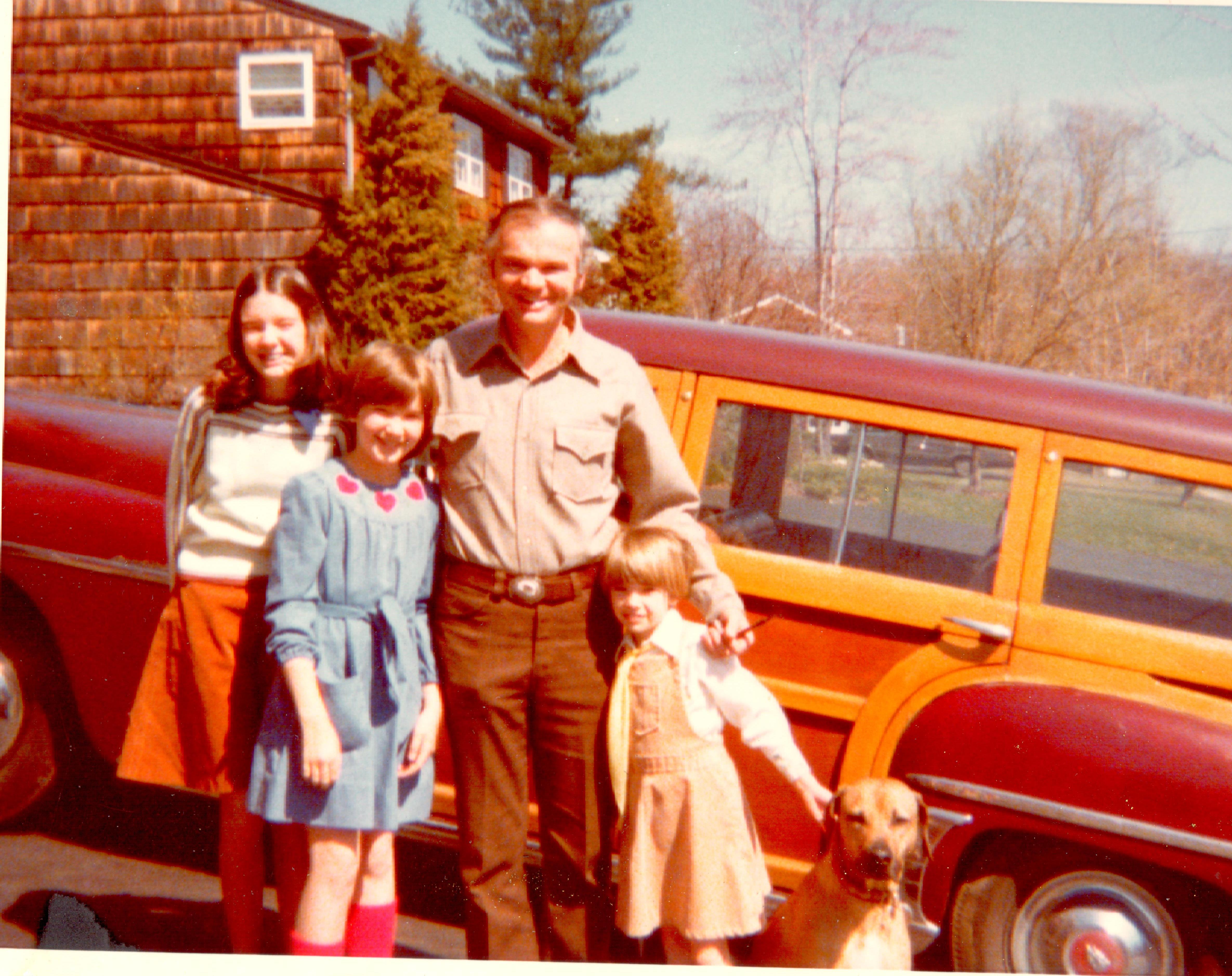 Because of Dad, we had the coolest cars in the neighborhood. Always.
Because of Dad, we had the coolest cars in the neighborhood. Always.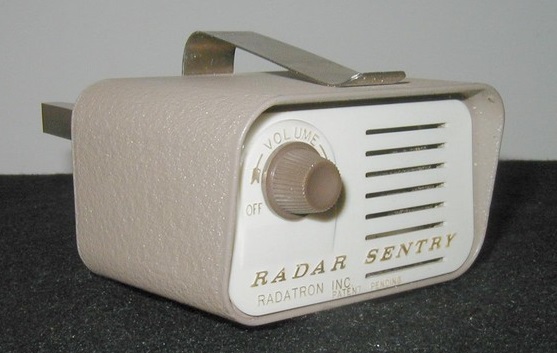 He had one of the first radar detectors and used it in states where it was illegal.
He had one of the first radar detectors and used it in states where it was illegal.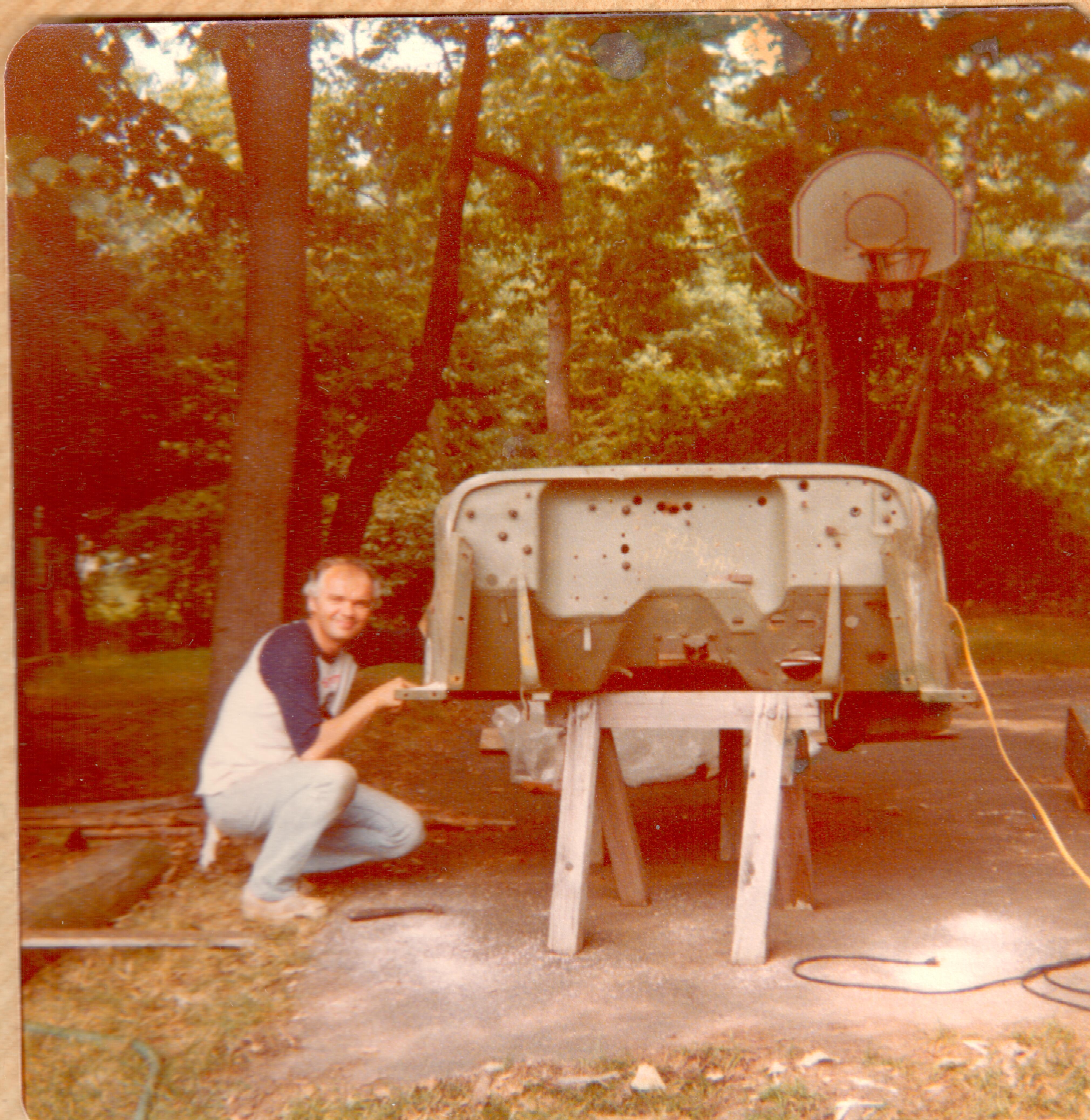 So many of us grew up with the movie Chitty Chitty Bang Bang. But that movie didn’t seem like fiction to us because we watched rusty heaps transform into magical vehicles in our garage on a regular basis.
So many of us grew up with the movie Chitty Chitty Bang Bang. But that movie didn’t seem like fiction to us because we watched rusty heaps transform into magical vehicles in our garage on a regular basis.


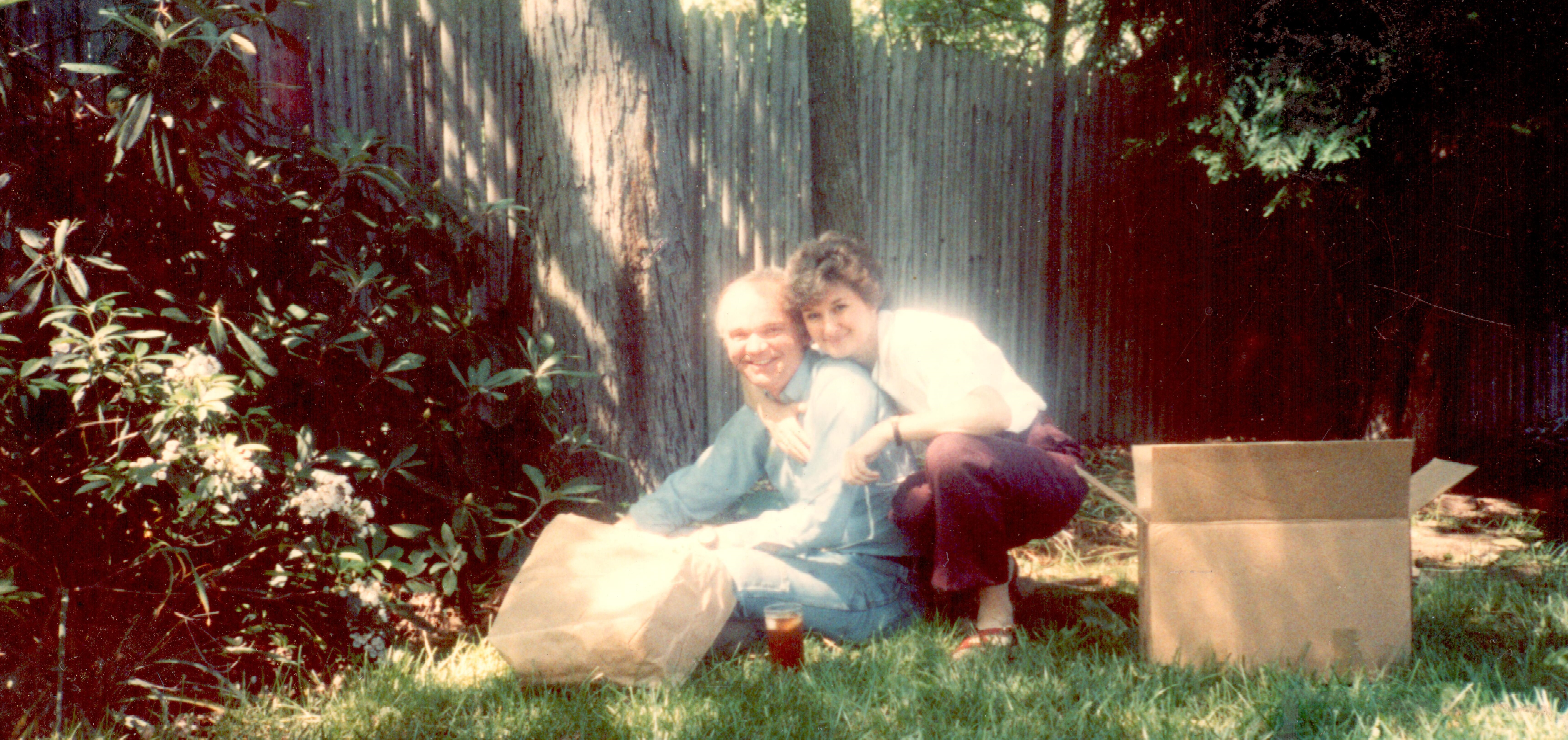 But the greatest love my dad had was for the two women in his life.
But the greatest love my dad had was for the two women in his life.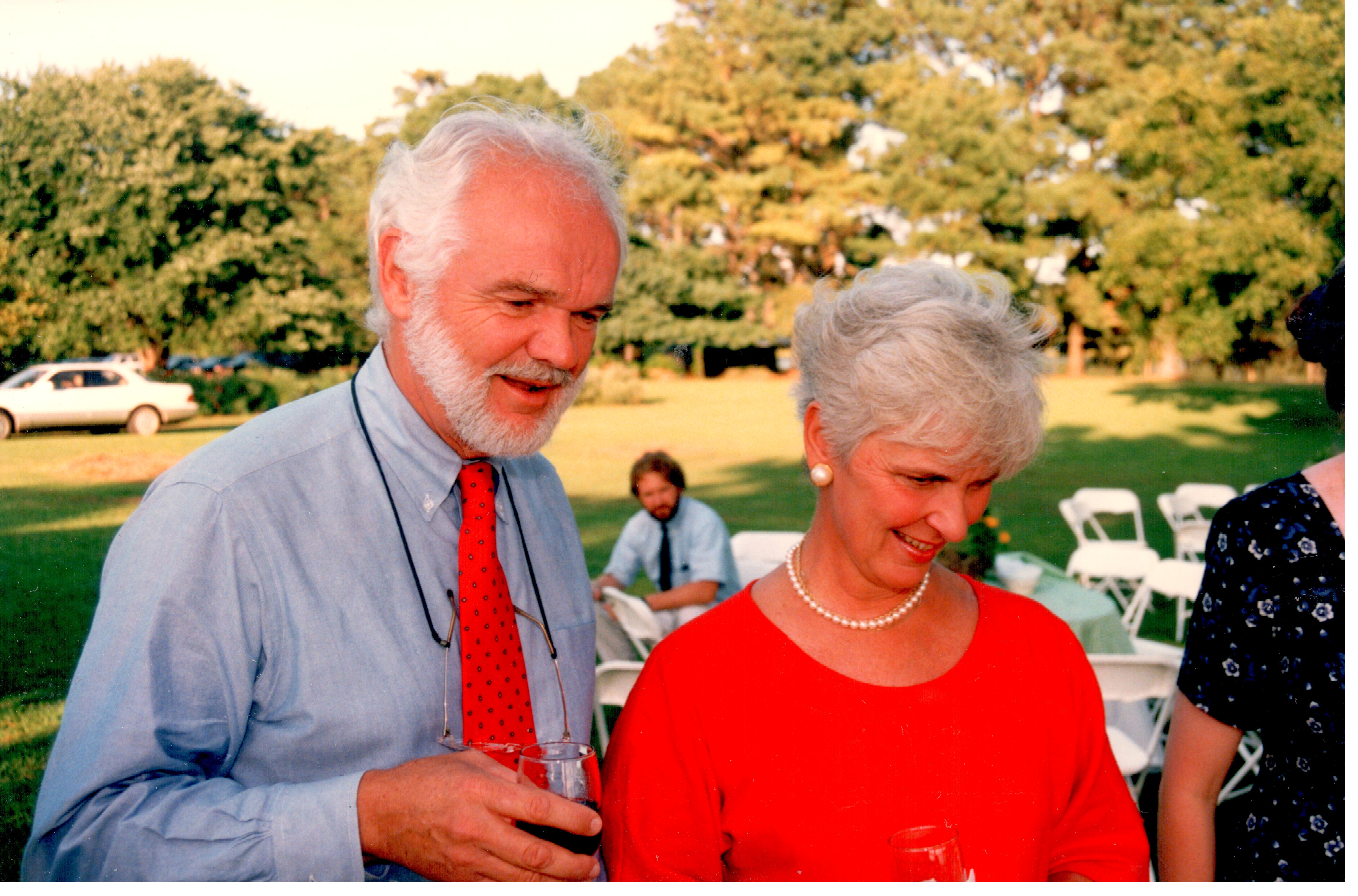 And I’m not just talking about how she restored joy to Dad’s life.
And I’m not just talking about how she restored joy to Dad’s life.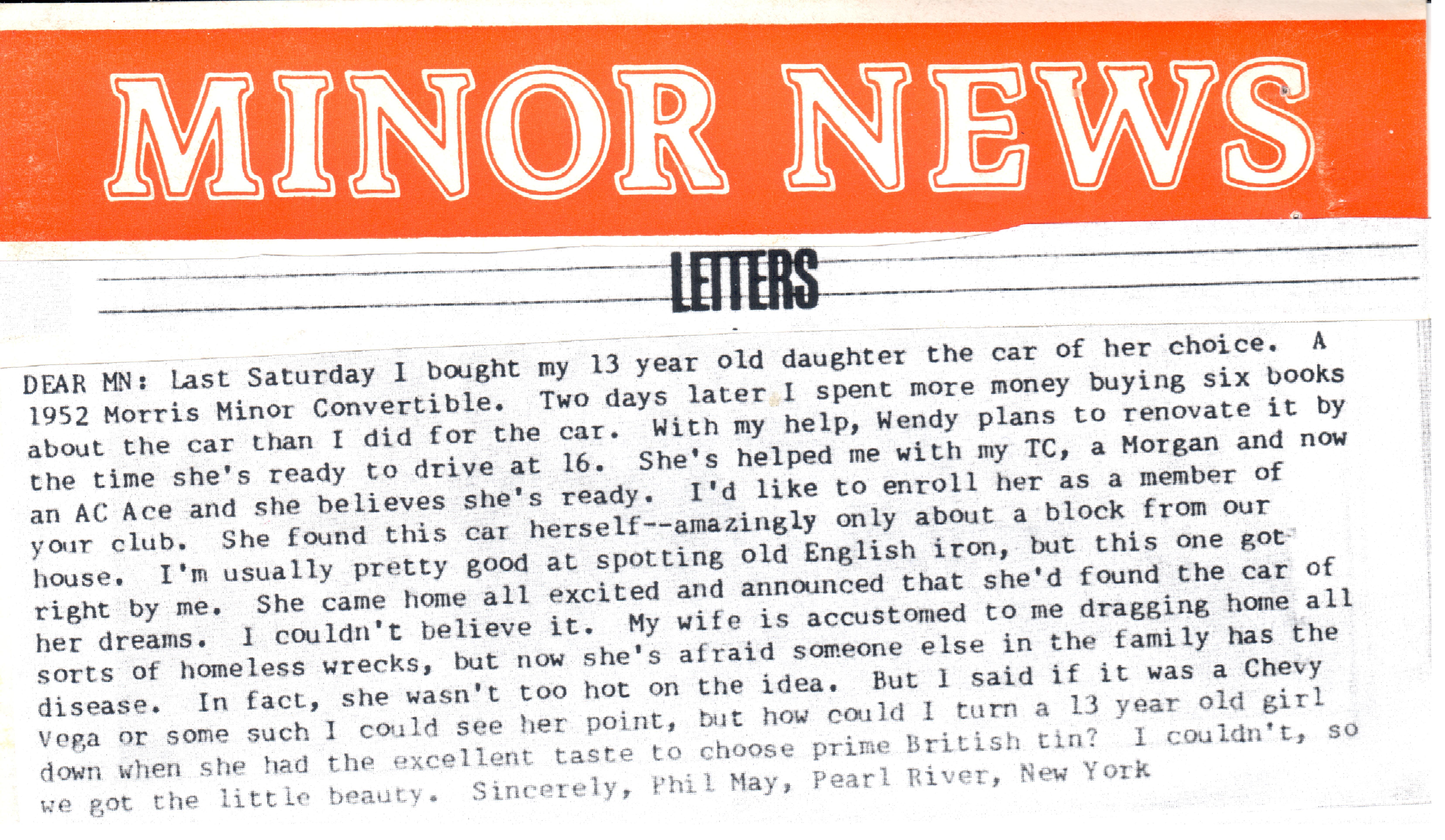
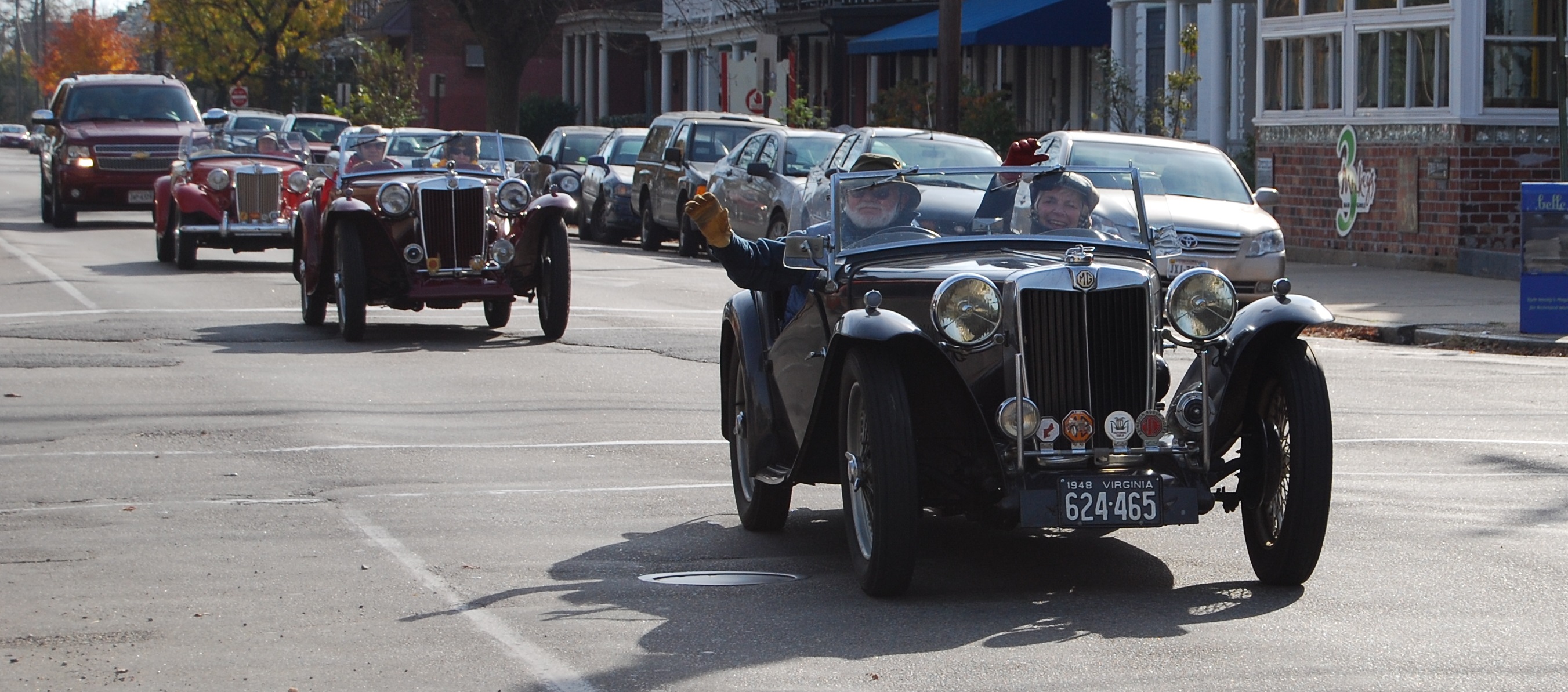
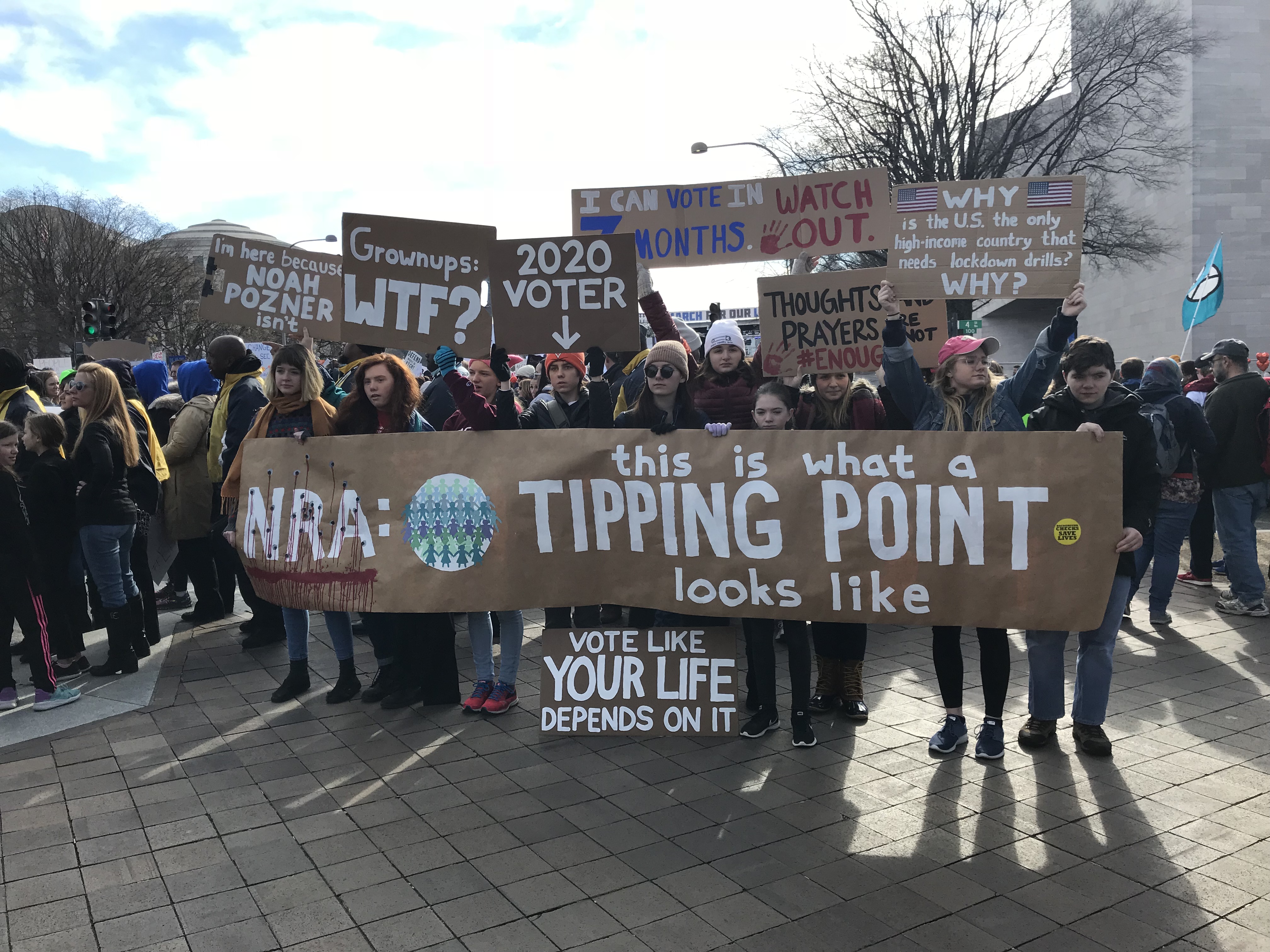 One of my most meaningful “March Moments” was when I realized I shouldn’t be holding up the end of our banner that declared “NRA: This is What a Tipping Point Looks Like.”
One of my most meaningful “March Moments” was when I realized I shouldn’t be holding up the end of our banner that declared “NRA: This is What a Tipping Point Looks Like.”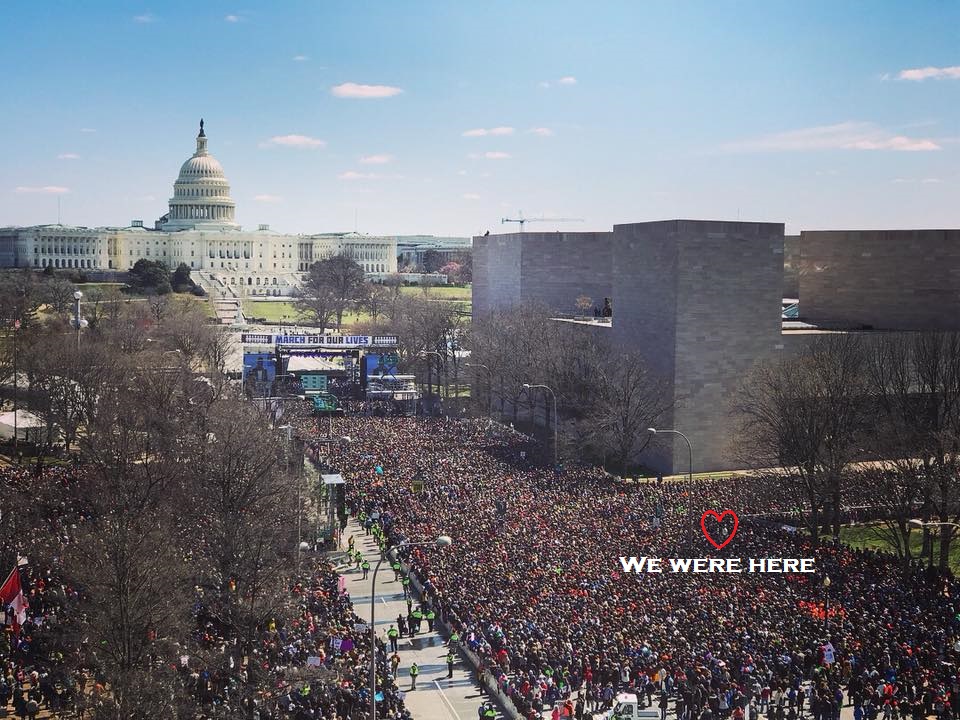 protests in their own neighborhoods. The fact that, despite
protests in their own neighborhoods. The fact that, despite 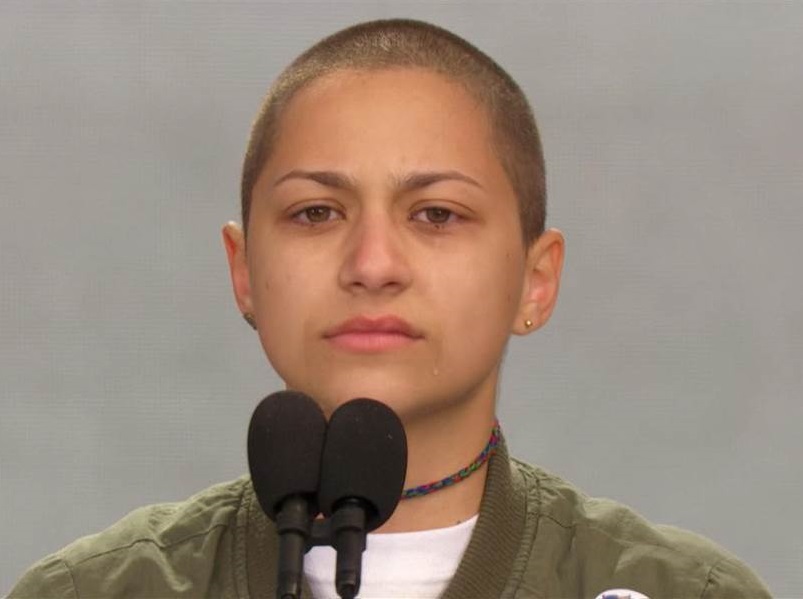
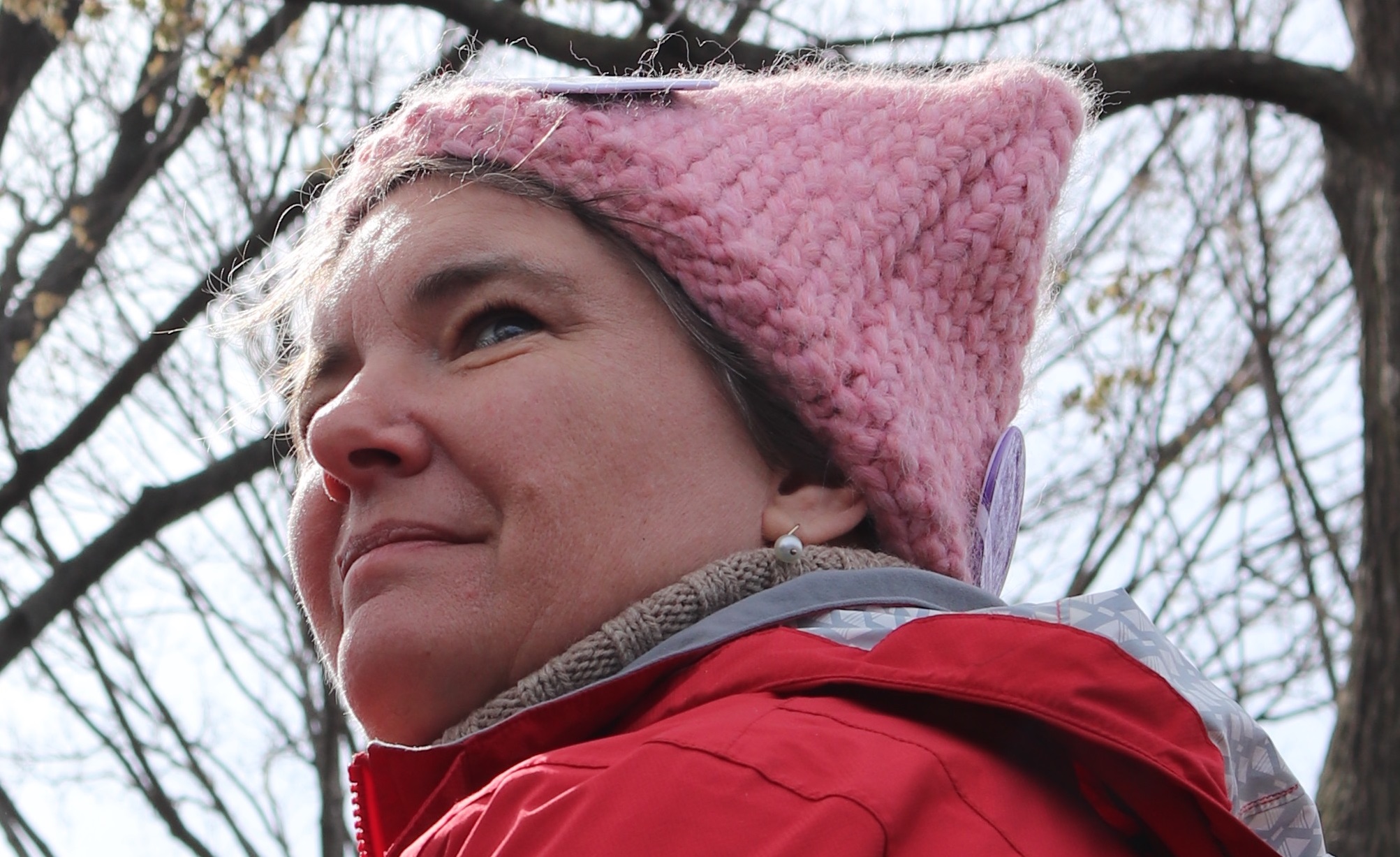
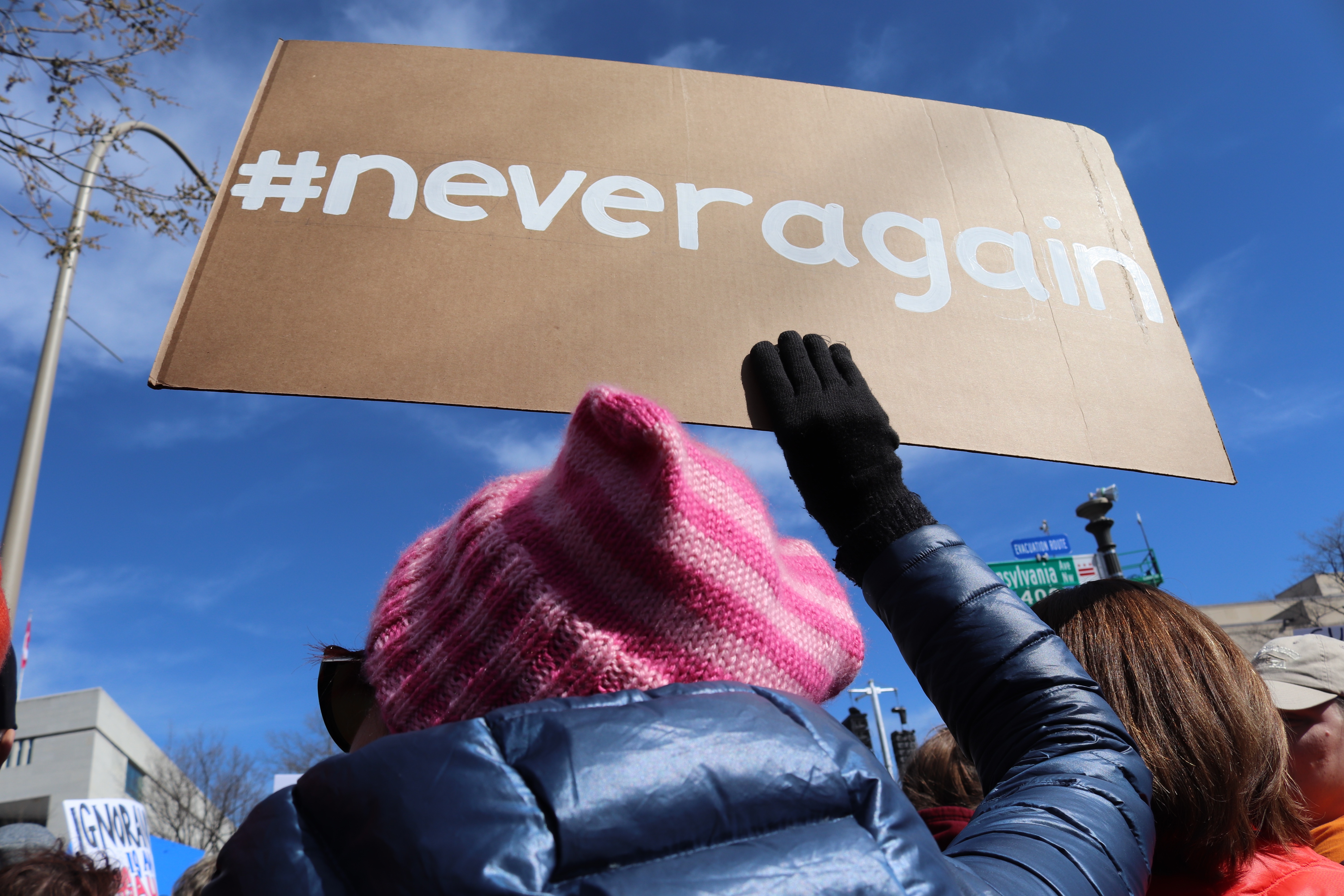
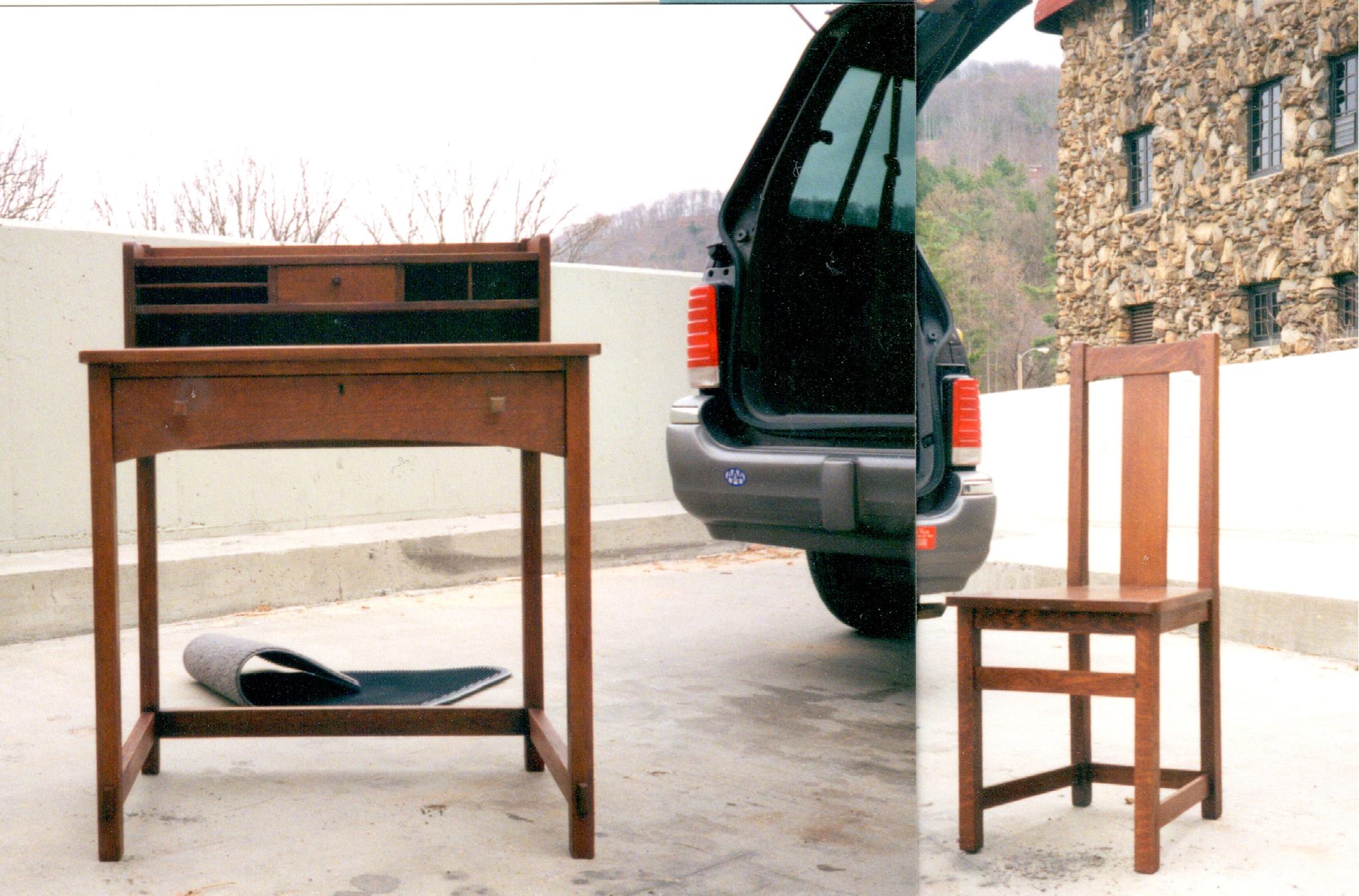 In November 2013, I randomly posted a 20-year-old photo of an antique Limbert desk and chair to my Facebook wall and wrote this:
In November 2013, I randomly posted a 20-year-old photo of an antique Limbert desk and chair to my Facebook wall and wrote this: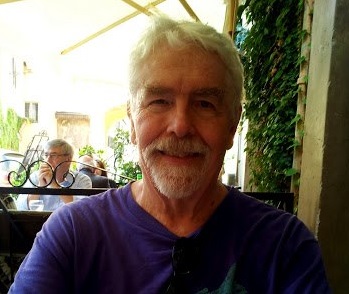
 It’s exquisite. It took hours upon hours. He first spent months building a pine prototype to work out all the kinks before executing mine in oak.
It’s exquisite. It took hours upon hours. He first spent months building a pine prototype to work out all the kinks before executing mine in oak. The desk’s three graceful arches required the construction of two grand, homemade compasses. Here’s an excerpt of his email about that:
The desk’s three graceful arches required the construction of two grand, homemade compasses. Here’s an excerpt of his email about that: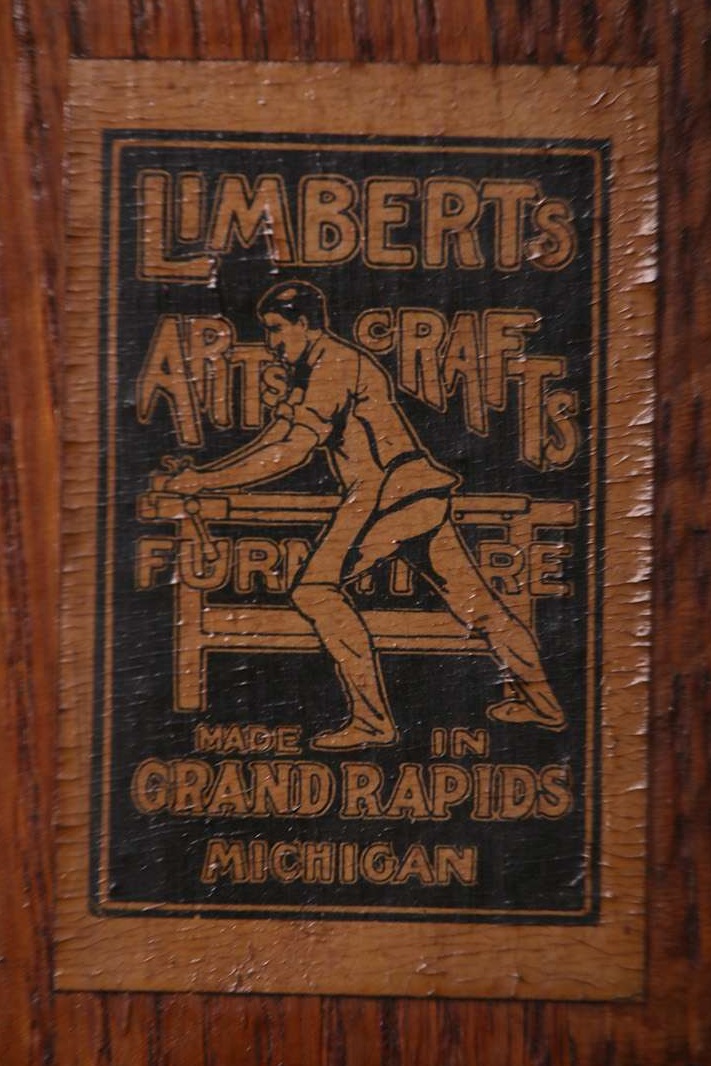 Another lovely, poetic email reads:
Another lovely, poetic email reads: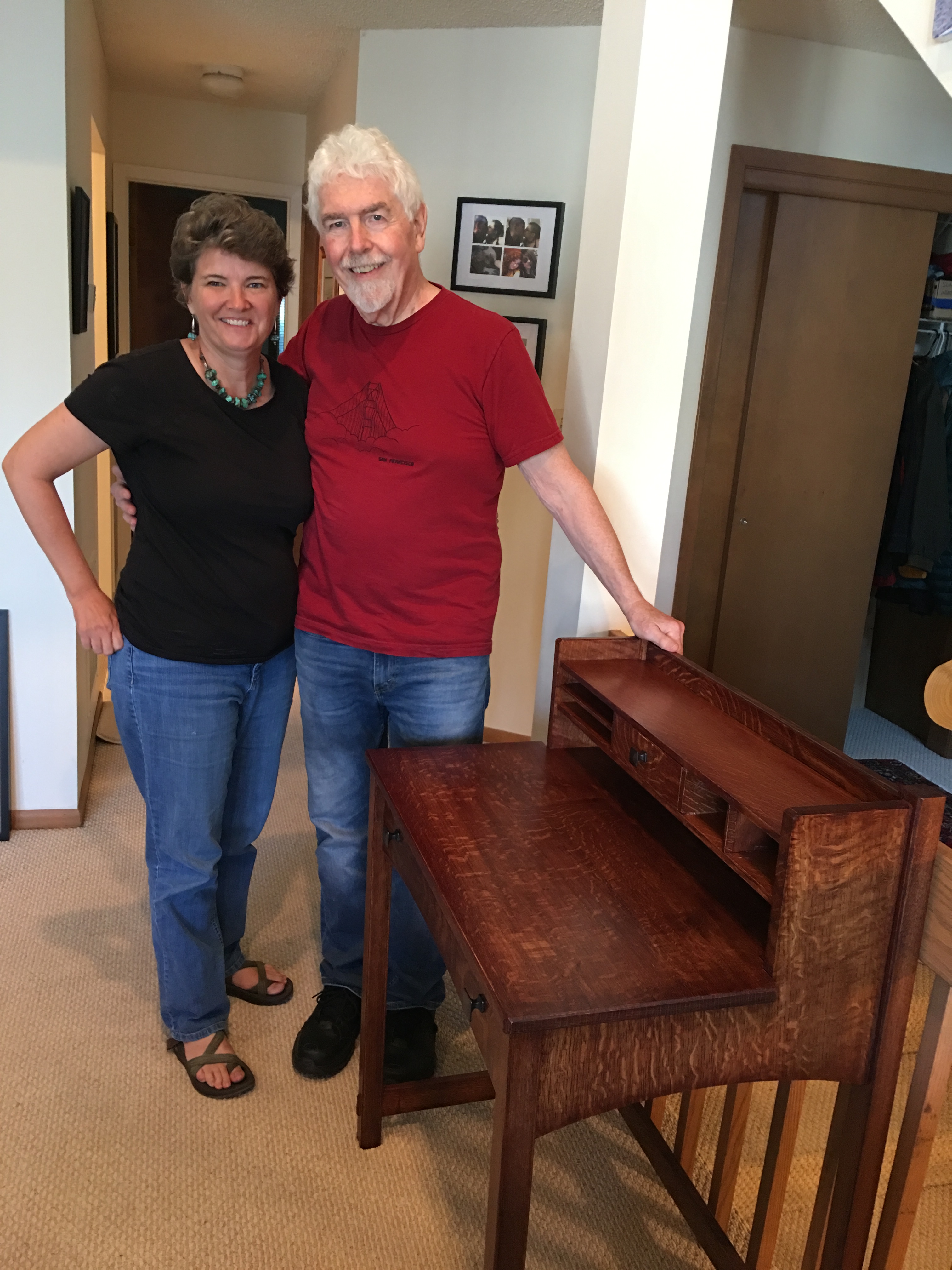
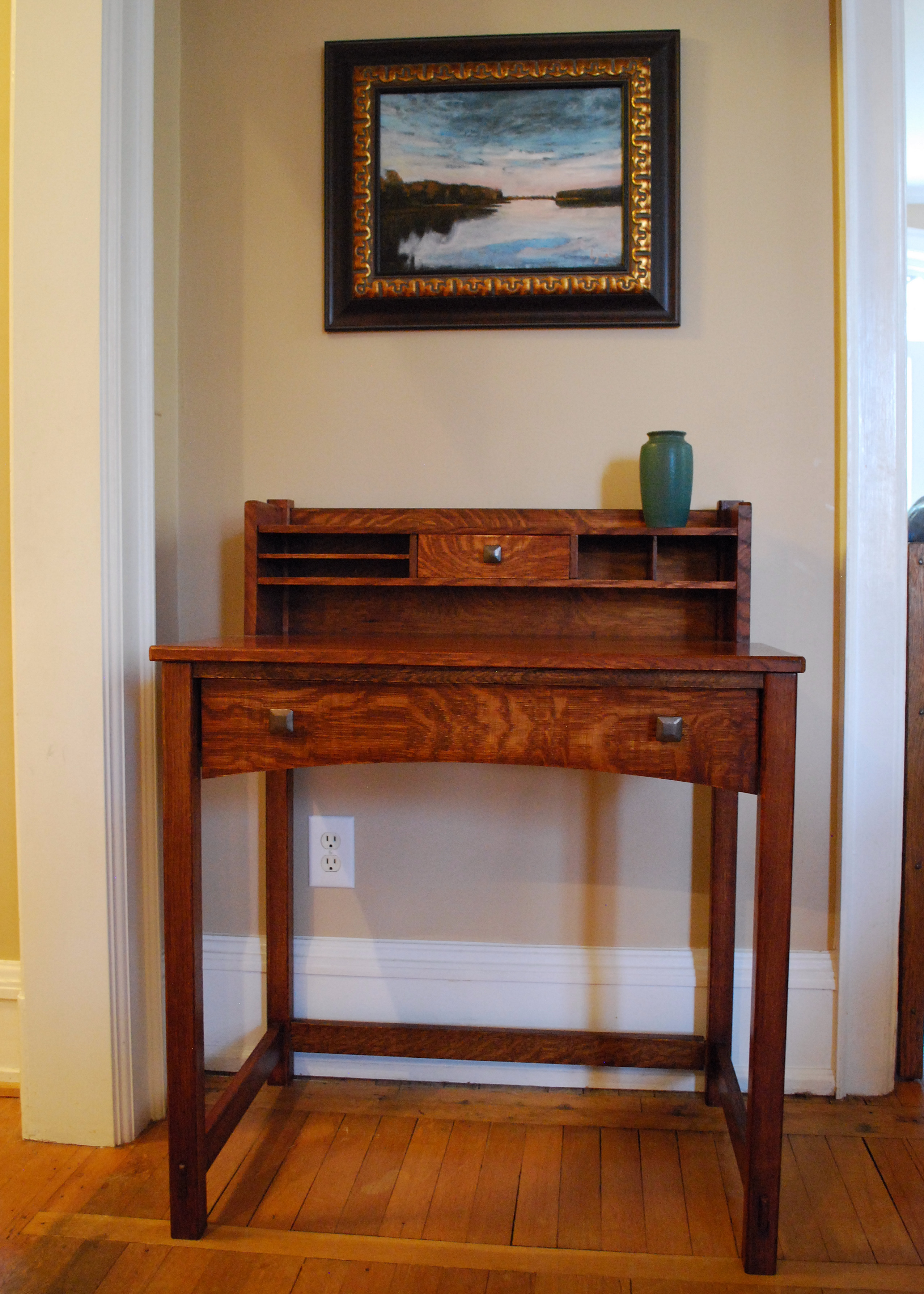
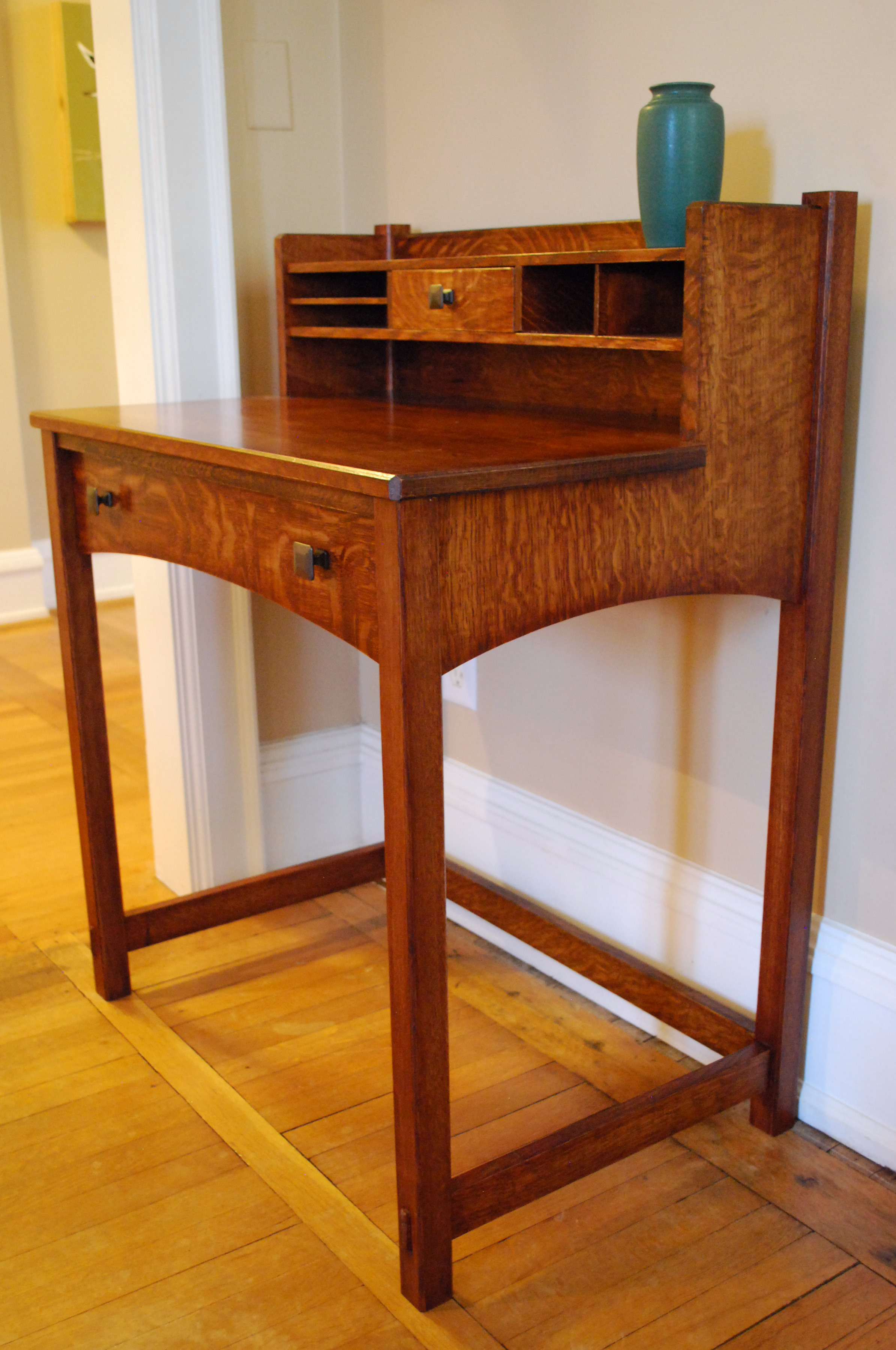
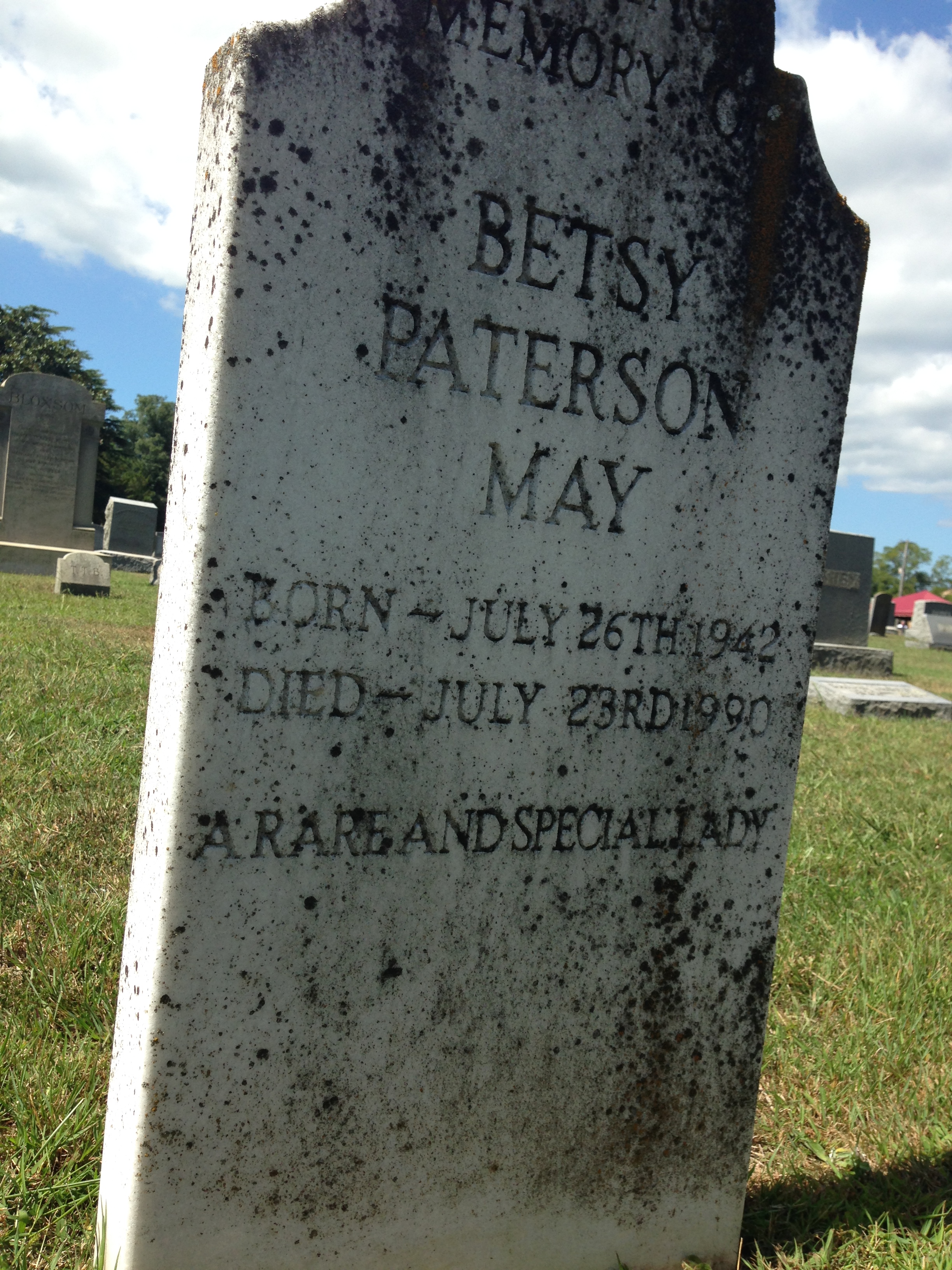 June 3 is a really big deal for me — the day I summit the solitary mountain that has long dominated my personal landscape. My mom’s death is easily my greatest tragedy and my biggest gift. Over the last few months, I’ve pondered my mom’s last days — sometimes soberly inhabiting them in “real time.” Today I take in her final vista. It’s a huge moment. I wanted to do something meaningful to acknowledge this milestone, and this poem satisfies that need in me.
June 3 is a really big deal for me — the day I summit the solitary mountain that has long dominated my personal landscape. My mom’s death is easily my greatest tragedy and my biggest gift. Over the last few months, I’ve pondered my mom’s last days — sometimes soberly inhabiting them in “real time.” Today I take in her final vista. It’s a huge moment. I wanted to do something meaningful to acknowledge this milestone, and this poem satisfies that need in me. 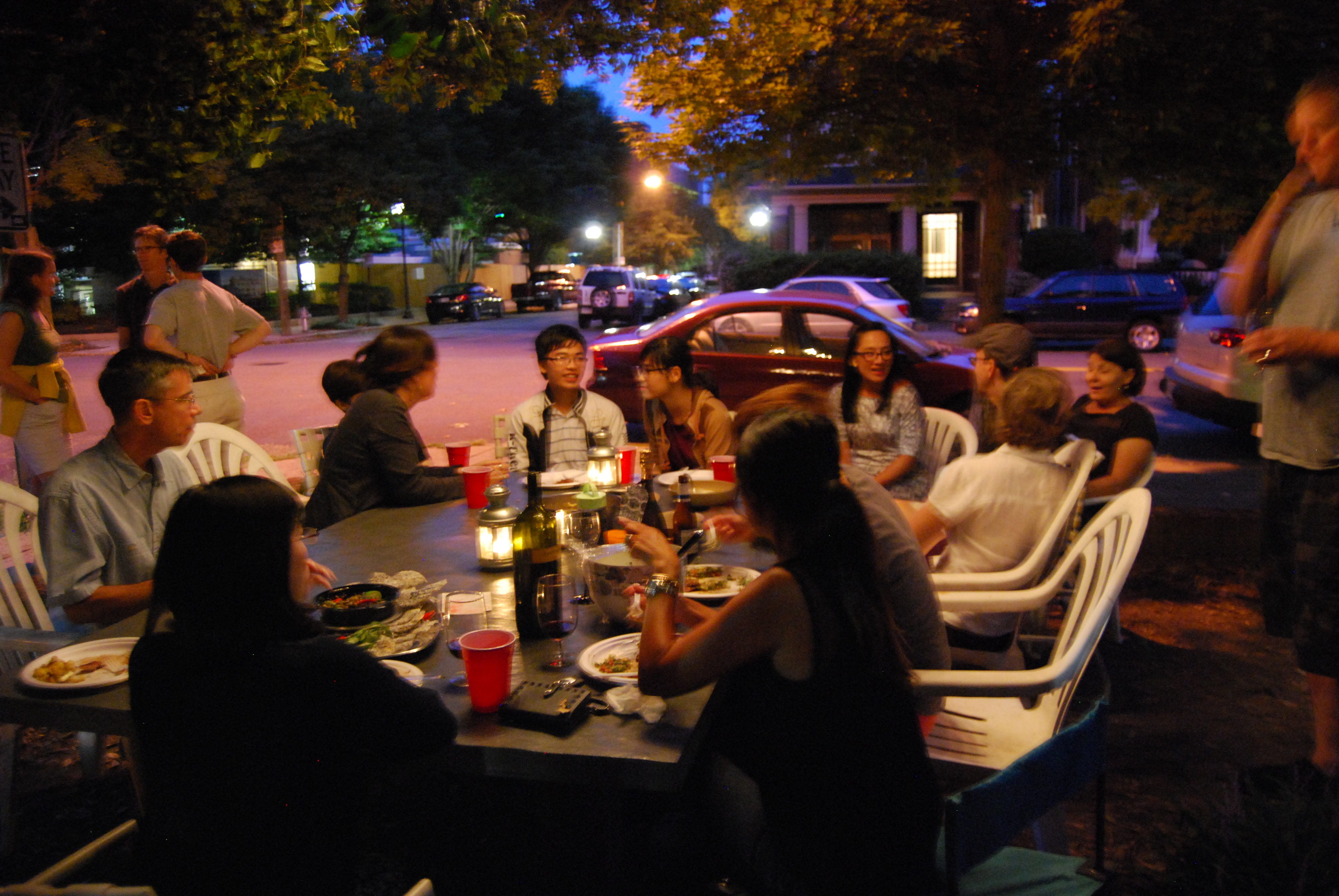 There’s an 800-pound slab of bluestone in our front yard, on the corner of Grove Avenue and Mulberry Street. It’s the top of a broad table – a table my family built because of something a stranger said, two years ago, at
There’s an 800-pound slab of bluestone in our front yard, on the corner of Grove Avenue and Mulberry Street. It’s the top of a broad table – a table my family built because of something a stranger said, two years ago, at 